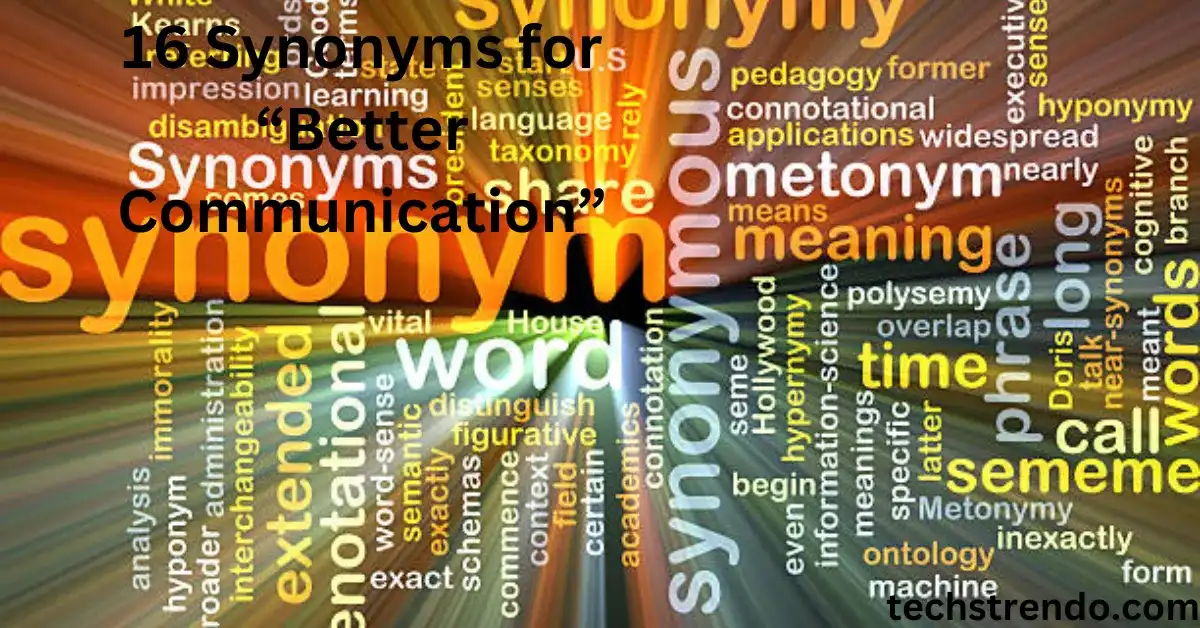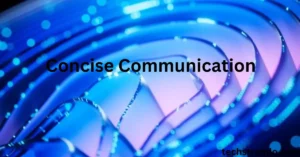In today’s fast-paced digital world, effective communication is more essential than ever. Whether in professional settings, personal relationships, or social interactions, the ability to express ideas clearly and concisely can be the key to success. If you want to improve your communication skills, understanding different ways to describe “better communication” can help you refine your approach.
This article explores 16 powerful synonyms for better communication and provides practical tips to enhance your interpersonal skills. Let’s dive in!
Enhanced Communication
Enhanced communication refers to elevating your communication skills to a higher level by implementing advanced strategies and techniques. This involves:
- Active listening
- Asking thoughtful questions
- Providing clear and concise responses
- Adapting your communication style to your audience
- Using emotional intelligence to connect with others
- Practicing mindfulness to stay present during conversations
By enhancing your communication abilities, you can build stronger relationships, improve collaboration, and achieve better results in both personal and professional settings.
Improved Communication
Improved communication signifies a conscious effort to refine and develop existing communication skills. It involves:
- Identifying and addressing communication weaknesses
- Developing new strategies to express ideas effectively
- Practicing and refining communication through feedback
- Engaging in self-assessment to identify areas for growth
- Attending workshops or training programs to enhance skills
Consistently improving your communication can help you become a more effective communicator and ensure better interactions.
Effective Communication
Effective communication means delivering a message in a way that resonates with the recipient and achieves the intended outcome. It includes:
- Clearly articulating thoughts and ideas
- Tailoring messages to the audience
- Anticipating and addressing potential misunderstandings
- Incorporating storytelling techniques to make messages memorable
- Utilizing non-verbal cues, such as eye contact and gestures
Strong better communication skills help build trust, encourage collaboration, and enhance both personal and professional relationships.
Clear Communication
Clear communication is the ability to express thoughts and ideas in a way that is easily understood. Key aspects include:
- Using simple, straightforward language
- Avoiding jargon or overly technical terms
- Providing relevant examples to illustrate points
- Structuring information logically for better comprehension
- Ensuring written communication is free of ambiguity and errors
Prioritizing clarity ensures your message is received and understood, reducing the chances of miscommunication.
Open Communication
Open communication encourages a two-way dialogue where all parties feel comfortable sharing their thoughts. This involves:
- Encouraging feedback and input
- Fostering an environment of trust and transparency
- Actively listening to others’ perspectives
- Being receptive to constructive criticism and diverse viewpoints
- Establishing a safe space for open dialogue in team settings
By promoting open communication, you can strengthen relationships and improve teamwork.
Efficient Communication
Efficient communication focuses on conveying messages quickly and effectively without losing clarity. It includes:
- Prioritizing key points
- Avoiding unnecessary details
- Using digital tools to streamline communication
- Leveraging bullet points and summaries for quick understanding
- Minimizing distractions and staying focused during conversations
Practicing efficiency in communication saves time and enhances productivity in interactions.
Seamless Communication
Seamless communication ensures a smooth and natural flow of information. It involves:
- Using appropriate tone and body language
- Anticipating the recipient’s needs
- Transitioning between topics fluidly
- Integrating different communication channels for consistency
Reducing communication barriers such as language differences or cultural misunderstandings
By striving for seamless interactions, you can enhance collaboration and create a more positive communication experience.
Optimal Communication
Optimal communication maximizes the effectiveness and impact of messages. This includes:
- Choosing the right communication channels
- Considering the audience’s preferences
- Continuously refining communication skills
- Using active voice for clarity and engagement
- Balancing verbal, written, and visual communication for impact
Focusing on optimal communication can help you achieve better outcomes and stronger connections.
Strong Communication
Strong communication involves expressing thoughts with confidence and conviction. It includes:
- Projecting authority and clarity
- Demonstrating a deep understanding of the subject matter
- Influencing others positively
- Building rapport through trust and authenticity
- Using persuasive techniques to make a compelling case
- Developing strong communication skills helps you build trust and credibility in both personal and professional settings.
Direct Communication
Direct communication is about being honest and straightforward without ambiguity. It requires:
- Clearly stating intentions and expectations
- Providing constructive feedback
- Addressing issues directly rather than avoiding them
- Reducing misunderstandings by being transparent and upfront
- Balancing assertiveness with empathy in conversations
Practicing direct communication fosters transparency and reduces misunderstandings.
Concise Communication
Concise communication focuses on delivering messages clearly and succinctly. It involves:
- Prioritizing essential information
- Using precise language
- Avoiding redundancy
- Ensuring brevity without sacrificing clarity
- Summarizing key points effectively for quick understanding
- Concise communication improves comprehension and keeps interactions engaging.
Frequently Asked Questions
What is better communication?
Better communication refers to improving one’s ability to express ideas clearly, engage in open dialogue, and foster stronger connections with others.
What are some synonyms for better communication?
Synonyms include enhanced better communication, effective communication, clear communication, articulate communication, and responsive communication.
How can I improve my communication skills?
To improve communication skills:
- Focus on active listening
- Ask clarifying questions
- Use clear and concise language
- Adapt communication style based on the audience
- Leverage technology for better efficiency
Final Thoughts
In an increasingly interconnected world, the ability to communicate effectively has never been more important. Whether in professional settings, personal relationships, or community engagements, better communication serves as a powerful tool for success.
By developing a broad range of better communication skills from active listening to clear and concise expression—you can build stronger relationships, resolve conflicts, and unlock new opportunities. Embracing modern better communication tools further enhances your ability to share ideas, collaborate, and stay connected.
Prioritizing and continually refining your communication abilities will open doors to new possibilities and allow you to make a meaningful impact in your interactions.


